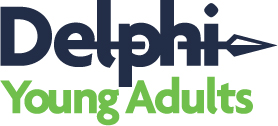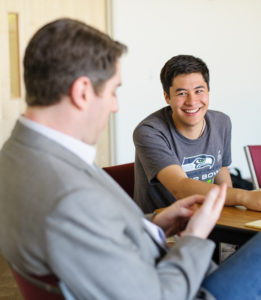Making a Difference for Young Adults with Autism
This story, written by Abbie Richert, was originally published in Plateau Living (April 2017) with a similar article in Madison Park Living (April 2017). You can find local copies in Sammamish or Madison Valley (Seattle). It is reprinted here with permission from the author.
 For young adults with autism, visibility and acceptance in the community are cornerstones of their personal and professional growth. Yet, there’s an overall lack of resources to support these young adults as they navigate life after high school. That’s where Delphi Young Adults comes in—a program that offers critical support during this transition period.
For young adults with autism, visibility and acceptance in the community are cornerstones of their personal and professional growth. Yet, there’s an overall lack of resources to support these young adults as they navigate life after high school. That’s where Delphi Young Adults comes in—a program that offers critical support during this transition period.
A local non-profit called Ryther, which provides psychiatric and behavioral health services for children and their families facing complex challenges started Delphi Young Adults. Ben Wahl, Program Director of Ryther’s Aspiring Youth Program said for autistic young adults, “The 18-24 age range is so important because it’s kind of that point at which they can go either way: they can get stuck and isolated, or become a part of the community.”
“We are really seeking to have community for young adults,” Ben said. “When they are school aged kids and around their peers, it’s about building skills. They didn’t always thrive socially at school, but at least they had that opportunity. But when they hit 18 they don’t.” They lose a built-in community, which is why Delphi Young Adults is desperately needed.
This year, Ryther will officially launch Delphi Young Adults. Parts of the program such as the Delphi Social Club, Workspace (group work projects) and a seminar project called Life 101 are already in the works. Whereas, a project called The Commons (residential living) should fall into place in the near future.
 The program’s backbone is built on the Delphi Social Club, which seeks to build community through planned social outlets. Ben said the Delphi Social Club is “A place to come together over shared interests.” The groups do anything from bowling to karaoke to indoor rock climbing. A secondary focus of the social program is identity building. “We like the term neuro-diverse,” Ben said. It’s a little broader and not, ‘hey, I’m going to this bowling thing because I’ve been diagnosed with autism,’ it’s just, ‘I’m quirky.’” Ben added that, “The Delphi Social Club has it’s own website.” Equipped with have interactive online circles, social club goers can contribute stories, video game reviews and more, and communicate about events taking place in the community. “It’s a way for them to connect, and it’s way better than Facebook.”
The program’s backbone is built on the Delphi Social Club, which seeks to build community through planned social outlets. Ben said the Delphi Social Club is “A place to come together over shared interests.” The groups do anything from bowling to karaoke to indoor rock climbing. A secondary focus of the social program is identity building. “We like the term neuro-diverse,” Ben said. It’s a little broader and not, ‘hey, I’m going to this bowling thing because I’ve been diagnosed with autism,’ it’s just, ‘I’m quirky.’” Ben added that, “The Delphi Social Club has it’s own website.” Equipped with have interactive online circles, social club goers can contribute stories, video game reviews and more, and communicate about events taking place in the community. “It’s a way for them to connect, and it’s way better than Facebook.”
Ben also said a number of young adults want to get involved on a deeper level. Rather than simply attending an event, they want to be a part of building and running it, which is why Workspace was created. Workspace is “A weekly group; they work on different projects and ideas, and right now they are working on the Delphi Social Club website.”
The coaching aspect of Delphi focuses on helping the young person navigate community college. “It’s a little bit like therapy, but coaching is a little more concrete,” Ben said. “We are not taking a psychological approach, but more of, ‘Are we are keeping track of community college assignments?’ ‘Are we budgeting?’ ‘Are we building independent living skills?’ That’s really important because a lot of my folks are employable and smart and very loyal and trustworthy.” Coaching goes hand and hand with Delphi’s Life 101 project. Ben said Life 101 is all about ‘adulting.’ They hold seminars focused on money management, cooking, dating, jobs, health and wellness.
At Delphi, overall wellness, independent living skills and social skills are competencies seen as important as being employable. “One of our outputs involves independence, Ben said. “If that involves a job, then by all means, but maybe it’s a slower progression. But it’s important that we continue to provide community.”
Delphi also plans to provide support through a program called The Commons, which Ben said is “A supportive dorm type situation, sort of a co-op.” Delphi is looking toward the model of micro-housing and is currently in talks with Neiman Taber Architects to obtain four units in their micro-housing buildings for young adults with autism. Although it’s a huge aspiration, they are hoping it will come together within the year.
Delphi brings the topic of community inclusion to the table. “We are really learning how to reach out to them and make them visible,” Ben said. “Working with young adults is really interesting. With young adults it becomes a broader initiative; between 18-24 if they’re involved in the community, if they’re gaining skills they’re going to integrate and will go on this path of being part of the community.”
Ben has worked with many young adults across the Plateau and encourages the community to continually stay involved. This summer, in partnership with R.E.I., he plans to lead trail building and restoration groups in Fall City, which is a great and nearby opportunity for Sammamish residents.
For more information on Delphi Young Adults call 206.517.0241.
Comments are closed.